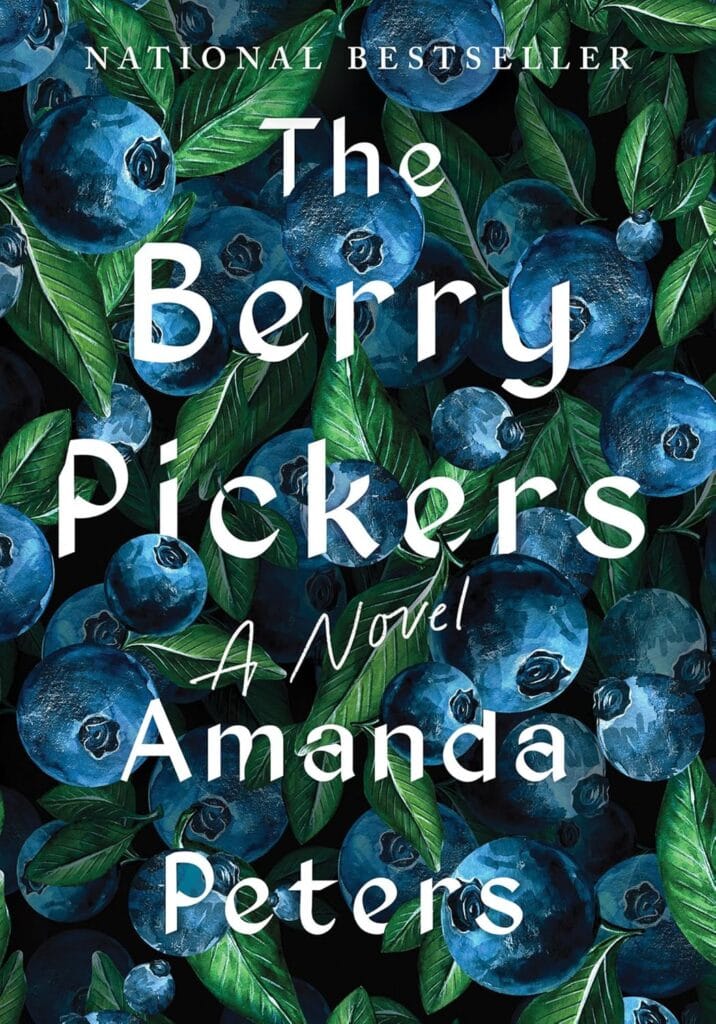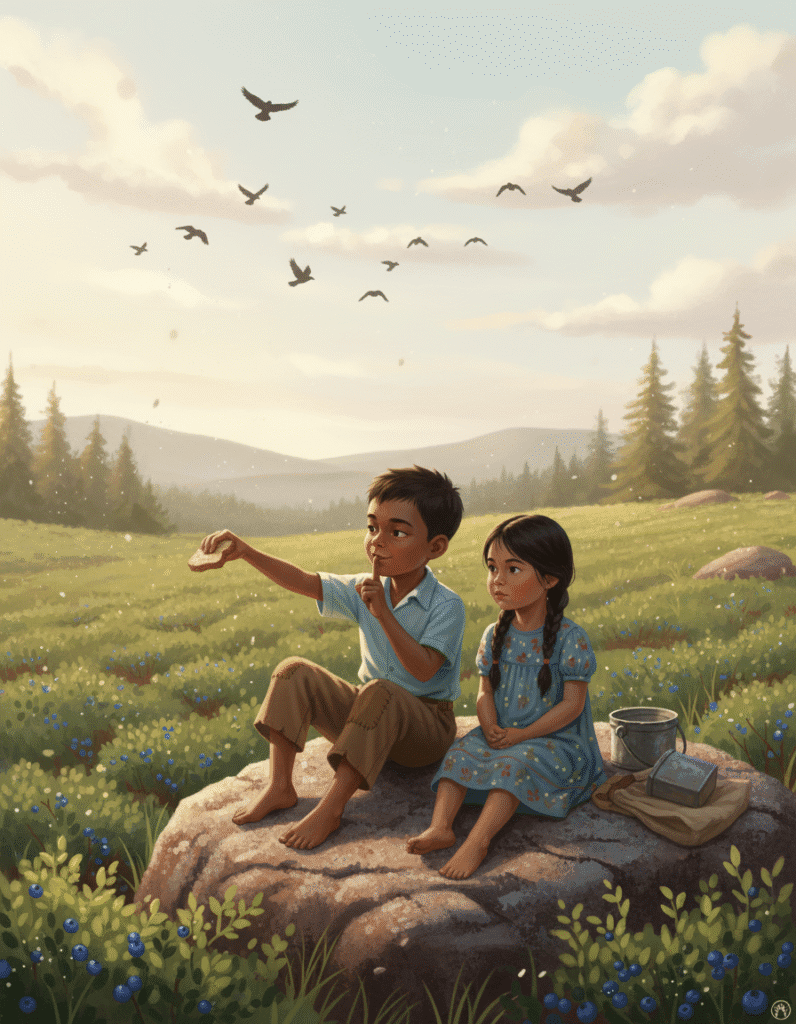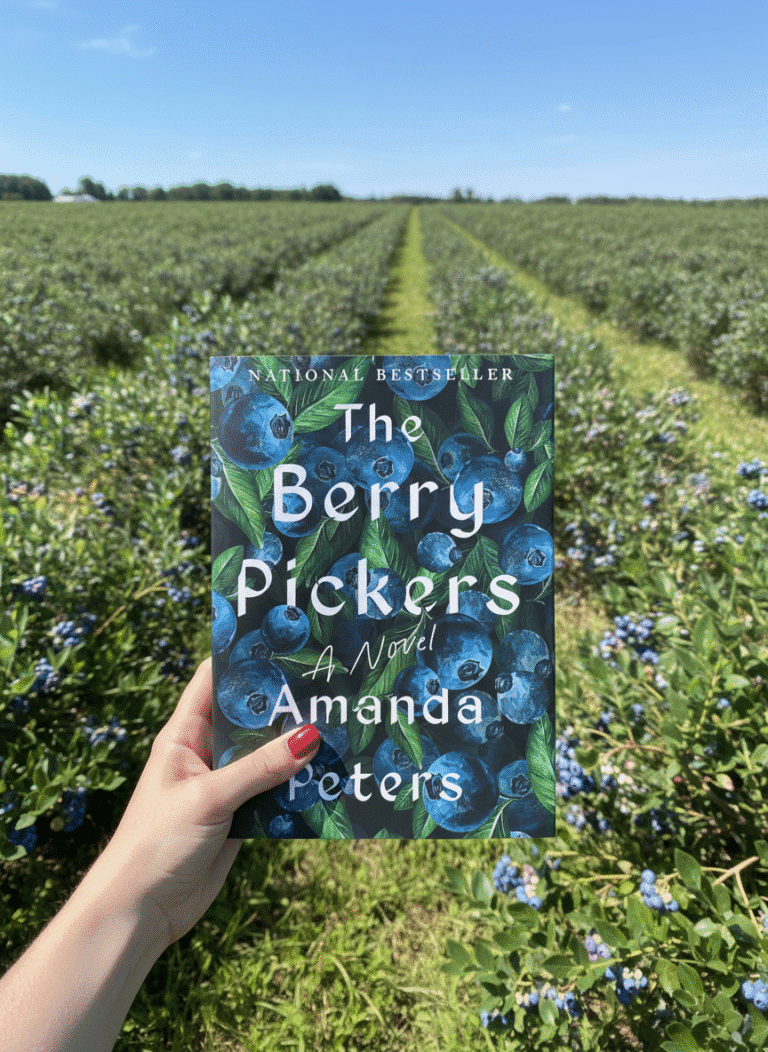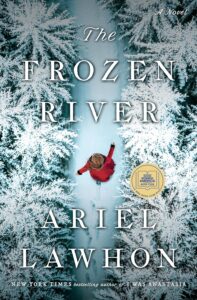
First Published: 2023
Genre: Literary Fiction, Family Saga, Historical Fiction
Time Period: Early 1960s to around 2012
Setting / Location: Maine, Nova Scotia and the city of Boston Massachusetts
Pages: 320
Table of Contents
Summary of The Berry Pickers by Amanda Peters
Imagine a family road trip, only instead of campfires and postcards, it’s long days under a burning sun, blackflies that bite through every layer of skin, and crates of blueberries picked for pennies. That’s the backdrop of Joe’s childhood in 1960s Maine. His Mi’kmaq family crossed from Nova Scotia each summer to work the berry fields, and that year should have been like any other until Ruthie, his four-year-old sister, vanished.

Joe, six years old at the time, remembers her patched blue sundress, her promise not to tattle about the wasted bread, her small hand steadying his back. Those fragments become the ghosts he carries into adulthood. The family’s desperate search was met with apathy from police and disdain from the landowner, Mr. Ellis, who cared more about rotting fruit than a missing child. And so grief seeped into their bones, reshaping each life that followed.
Meanwhile, in another corner of Maine, Norma was growing up in a house of secrets. Her parents wrapped her childhood in explanations that never quite added up; skin tone chalked up to an “Italian ancestor,” early photos burned in a convenient fire, friends kept at arm’s length by a mother’s suffocating fear. Norma’s recurring dreams felt more like memories than fantasies. But every time she asked questions, guilt was handed back as the answer.
The story arcs between Joe’s losses and Norma’s suffocating upbringing, one shaped by lies and a fragile maternal grip. As decades pass, both lives unravel in their own ways: Joe wandering through pain, drink, and regret; Norma finding temporary freedom only to face fresh heartbreak when her daughter is stillborn. It’s the sort of generational trauma that echoes eerily in today’s headlines about stolen Indigenous children, fractured families, and communities forced to live with unanswered questions.
When truth finally surfaces that Norma is Ruthie, stolen by a grieving woman who convinced herself she was “rescuing” a child, the reunion is bittersweet. Joe is dying, time is short, and yet for the first time, the siblings can sit in the same room, sharing laughter alongside sorrow. The novel closes on a tender image: Ruthie, now grown, burying part of Joe’s ashes near the family’s cabin, standing hand-in-hand with her niece, ready at last to release the ghosts she’d carried unknowingly all her life.
This book doesn’t hand out tidy resolutions. Instead, it lingers on the “what ifs,” the devastations, and the small mercies that let a family survive the unbearable. It was a powerful look at a dark chapter of Canadian history that had very real consequences for so many. It’s heavy, yes, but told in a way that’s deeply human—sometimes raw, sometimes tender, often painfully familiar. And it makes you wonder: how many hidden histories still sit unspoken in the soil beneath our feet?

List of Characters in The Berry Pickers
This is a comprehensive list of all the over 40 characters in The Berry Pickers in alphabetical order:
- Alice is a very good friend of Aunt June’s. She talks with a young Norma about her confusing dreams.
- Angela attends college classes with Norma.
- Andrew is another one of Norma’s classmates.
- Archie Johnson belongs to another family of berry pickers and causes trouble at a local carnival.
- Aunt June is the sister of Norma’s mother, Lenore. She serves as a confidante for Norma.
- Aunt Lindy is the older sister of Lewis, Joe’s father.
- Ben is Joe’s protective older brother.
- Bernard and Hank are twins who are part of the Mi’kmaq berry picking crew.
- Boyd is a young boy who lives in an apartment above Aunt June and seems to have a crush on Norma.
- Candice is a friend who speaks about her memories of Alice after her passing.
- Charlie is one of Joe’s older brothers.
- Cora works with Joe at a gas station and later becomes his wife.
- Lewis is the family patriarch. He is a hardworking man who arranges the work crews for the annual berry harvest in Maine.
- Diego is a man from Mexico who works alongside Joe in the berry fields.
- Ernest is a resident at the Shady Oaks retirement home.
- Frank is Norma’s father.
- Father Michael is the priest at the family’s church back in Nova Scotia.
- Frankie is a member of the berry picking crew. He is known for being a funny man who enjoys a drink but isn’t a very productive worker.
- Georgia, who prefers to be called Desiree, is a college friend of Norma’s.
- Harris works as a coordinator for the American hunters who hire Lewis as a guide.
- James is a local hardware store owner who marries Mae.
- Janet is Norma’s only real friend from her childhood in Maine.
- Janice Hall is a woman from Lenore’s church who adopted a boy.
- Jeffrey is Leah’s boyfriend.
- Joe is a Mi’kmaq man who, from his sickbed, looks back on his life, which was forever changed when his little sister vanished from the berry fields.
- Juan is a Mexican worker who eventually takes over as the foreman in the berry fields.
- Julia and Old Gerald are a married couple who travel with the family to pick berries each year.
- Leah is Joe’s adult daughter. She visits him regularly as he is dying.
- Leonard is a man who lives in the apartment building owned by Aunt June.
- Mae is Joe’s spirited and direct sister.
- Mark is a man Norma meets on a train who she eventually marries.
- Mom (Joe’s mother) is the family matriarch. She is a woman of strong faith.
- Lenore is Norma’s mother. She is extremely protective and anxious, and her life is shaped by tragedies from her past.
- Mr. Ellis is the white man who owns the berry fields in Maine where the family works every summer.
- Mr. Hughes is the Indian agent who has authority over where the children go to school.
- Mr. Richardson is a local business owner who is involved in a serious accident with Joe.
- Nina is a Nipmuc woman Ben meets while involved in an Indigenous rights protest.
- Norma is a woman who was raised as an only child in Maine and is troubled by vivid dreams that feel like memories from a life she can’t place.
- Randall was a boy who went to Norma’s school.
- Roger is a mechanic who works at the same gas station as Joe and Cora.
- Ruthie is Joe’s younger sister. She disappears from the berry fields in Maine when she is just a little girl.
- Sarah is the name Norma and Mark give to their baby.
- Trinity is another of Norma’s college classmates.
- Widow Agnus is a woman who brings her six children to work in the berry fields.
Book Club Questions for The Berry Pickers
- Norma grows up feeling like something is out of place, with dreams and sensations that don’t match her life. Before you knew the truth of her past, what did you think was happening?
- Joe’s life is defined by a deep sense of guilt, first over Ruthie’s disappearance and later over Charlie’s death. How do you see this guilt shaping his major life decisions, including his marriage to Cora and his long absence from home? Do you feel his guilt was something he deserved, or was it a burden he carried for others?
- Let’s compare the two mother figures, Norma’s mother, Lenore, and Joe’s mother. One shows her love through fear and confinement born from a terrible secret, while the other expresses it through persistent hope and faith. How did their different styles of mothering affect their children, and can you find any sympathy for Lenore’s actions?
- What do you believe were the individual motivations of Frank and Aunt June for keeping such a monumental secret for decades? Was their silence an unforgivable betrayal, or was it a complicated act intended to protect the people they loved?
- The family’s interaction with the police officer in the woods is a short but critical scene. What does this moment reveal about the value placed on an Indigenous child’s life by the authorities at that time? How might the entire story have unfolded differently if the family had been white?
We hope you enjoyed these book club discussion questions. If you’re looking for more ways to get your book club talking, check out our Comprehensive Book Club Guide Kit for The Berry Pickers by Amanda Peters. This guide come with everything for an unforgettable book club meeting. Inside you’ll find:
- Over 30 thought-provoking discussion questions in printable PDF format that will help you explore the novel’s themes.
- Fun icebreaker questions to get everyone talking.
- Challenging word search puzzles featuring names and places from the book.
- Delicious themed food and drink ideas inspired by the novel.
- Insightful book quotes with explanations to help you understand the novel’s deeper meaning.
- Meeting record templates for jotting down thoughts and organizing your meetings, and so much more!
People tell us our guides are perfect for hosting great book club meetings. They are also helpful for anyone reading the book alone and looking to get more out of the story.
Frequently Asked Questions - The Berry Pickers
Is the Berry Pickers a true story?
While The Berry Pickers is a work of fiction, the author, Amanda Peters, drew inspiration from stories her father told her. Her father’s experiences in the Maine berry fields helped shape the world of the book
Who stole Ruthie in The Berry Pickers
A woman named Lenore is the one who took Ruthie. Lenore, who was grieving the loss of several babies, was driving when she saw four-year-old Ruthie sitting by herself on a rock. Believing the child had been abandoned, she put her in the car and took her home. Lenore and her husband, Frank, then raised Ruthie as their own daughter, giving her the name Norma.
What disease does Joe have in The Berry Pickers
Joe suffered from cancer. The disease had spread throughout his body, reaching his lungs and into his bones.
Amanda Peters Biography
Amanda Peters is a Canadian writer of Mi’kmaw and settler ancestry from Nova Scotia’s Annapolis Valley and a member of Glooscap First Nation. Her fiction often explores family, memory, and the long reach of loss across generations. Peters earned an MFA from the Institute of American Indian Arts (Santa Fe) and a creative writing certificate from the University of Toronto.
Her debut, The Berry Pickers (2023), became a breakout success—winning the Andrew Carnegie Medal for Excellence in Fiction and the Barnes & Noble Discover Prize, and earning additional shortlist nods in Canada. She has since published a short-story collection, Waiting for the Long Night Moon, which gathers prizewinning and new stories.
Beyond books, Peters’ shorter work has appeared in literary journals including The Antigonish Review, Grain Magazine, and Alaska Quarterly Review. She was recognized by the Indigenous Voices Awards for “Pejipug (Winter Arrives)” and for the title story of her collection.
Awards snapshot
Andrew Carnegie Medal for Excellence in Fiction (Winner) — The Berry Pickers (2024)
Barnes & Noble Discover Prize (Winner) — The Berry Pickers (2023)
Dartmouth Book Award for Fiction (Winner) — The Berry Pickers (2024)
Was this post helpful?
We’d love to hear from you : )
Wondering What to Read Next?
Discover your next book read tailored to suit you! No more long book recommendation quizzes that make your eyes go dizzy.
Our book recommendation engine knows exactly what book will captivate you next.
Simply tell us what you’ve loved reading, and well unveil a perfect match for your reading pleasure.
You will absolutely love it!




